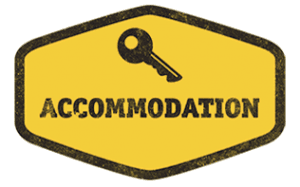Accomodation
Living on campus
Your uni website will tell you what’s available on campus.
Campus accommodation can offer more support and social interaction than other options, which can be helpful when you are living away from home for the first time.
If you are living on campus, find out what is supplied, both in your room and common areas, and what you need to bring with you. A power board and a study lamp are useful, as are a few cups, plates, glasses and cutlery for those in-room snacks!
Take a pair of thongs for the shared bathrooms and consider a bathrobe for getting from B(edroom) to B(athroom).
Things can go missing from common areas so make use of the lockable facilities.
On campus accommodation will provide the option of catered (meals supplied in a cafeteria) and self catered (you cook your own meals in a shared kitchen).
Catered
Pros
- You don’t have to think about food preparation or spend time shopping and cooking.
- Can be a great way to meet people and provides time to catch up with other students.
- Partial catering is available at many unis.
Cons
- You may not always like the food.
- You pay for meals not used if you’re away or busy.
Self-Catered
Pros
- You learn to cook and plan.
- You can learn cooking tips and new cuisines from other students.
- Interaction with others can lead to great friendships.
Cons
- You need to factor in meal preparation, shopping and cleaning time.
- You will need to negotiate cooking and cleaning times with others.
- Wastage of food and money if not well planned.
Off campus Accomodation
Start with your university’s accommodation service. They’ll have advice on how to find local accommodation and suitable flatmates.
Go to www.moneysmart.gov.au for more information on the cost of moving out, choosing a place and sharing with flatmates. There’s a good moving out checklist in the Under 25s section.
Renting
You may have to sign a lease, which is a contract for payment of rent. This makes the people who sign it responsible for the property, the way it is kept and any damage.
In most cases you will need to pay a ‘rental bond’ of about four weeks rent to cover any damage or unpaid rent. You will get your money back at the end of the lease if you have met your obligations under the lease — so read it before you sign it!
Landlords and real estate agents like references. If you don’t have any rental references, at least try to have references showing you are responsible and of good character. Remember to get a reference at the end of a lease to help with your next rental application.
If you have valuable items, you might also want to look at taking out contents insurance.
What you need
When you set up a house for the first time there will be quite a few things you need, but a lot can be borrowed, rented or bought second-hand.
Your family and friends may have items they don’t use or want anymore, so ask around before you buy a fridge or lounge. Look up online sites such as Freecycle, Ziilch and Ozrecycle, where people list free items or check second-hand selling sites for bargains. Also check the streets in your local area the day before kerbside collection days for unwanted goods.
Charity shops will become a great resource when you’re at uni. Some will even contact you when items you are looking for come in and most can arrange for large items to be delivered.
Sharing the responsibility of furnishing a share house is helpful and reasonable. For example, one flatmate provides a fridge and someone else brings the washing machine.
The basics
Your room: bed, clothes rack, desk, chair, reading lamp.
Shared areas: fridge, washing machine, dining table and chairs, lounge, TV, cooking and eating utensils.
Don’t forget the cleaning stuff (even if you don’t plan to use it very often) like a mop, broom and vacuum cleaner.
You don’t need to replicate your family home and you will be surprised what you can do without as a student. Stick to the basics and add more things as needed.
Living with Housemates
When you share a house it’s all about compromise!
Try not to leave your dirty dishes around and do your fair share of the housework. A good tip is to set up a roster for the cleaning of shared areas like bathrooms and the kitchen.
You will have different opinions about the running of the house but if you are patient and willing to listen to each other you’ll have a great time flatting and learn a lot from the experience.
Cooking for beginners
- Even if you’re not a gourmet cook you can still cook decent meals for yourself and maintain a healthy diet.
- Try and make big meals so you have leftovers for lunch or dinner. Freeze batch cooking in portions to give yourself some cooking free days each week.
- Buy meat in bulk when on sale and freeze in batches.
- Throw in whatever vegetables are in season; they’ll be both cheap and tasty. You can freeze them in snap lock bags before they perish.
- Keep some tinned food for quick meals. Tinned fish and beans are a great standby.
- You can find lots of recipes and instructional videos online (even if you need help learning how to boil an egg).
Here are a few of the CEF’s favourite easy recipes…
Omlette
Ingredients:
3 eggs
1 rasher of bacon, diced
2 mushrooms, diced
4 cherry tomatoes, halved
Method: Crack eggs into a bowl and whisk. Chop remaining ingredients and combine with egg mixture. Put a fry pan on medium heat and coat the pan with a splash of olive oil. Pour egg mixture into pan and let cook for around three minutes. Once it looks set, use an egg flip to fold half the mixture on top of the other half and allow to cook for another three-five minutes. Your omelette should be firm but not dry when ready. Slide onto a plate and season with salt and pepper.
MacGyver Fried Rice
Ingredients:
Leftover rice
Soy sauce
Diced meat
Diced carrot, Peas, Corn
Chopped broccoli
(or use whatever ingredients you have in your fridge)
Method: Put a frypan on medium heat and add a splash of olive oil. Add your chopped vegetables and cook for three to five minutes until they soften. Then add one cup of leftover rice and stir everything well. Heat for two minutes before adding a tablespoon of soy sauce. Give everything a good stir and let it warm for another two minutes. Done!
Easy pizza
ngredients:
Flat bread/wraps
Tomato paste/sauce
Leftovers
Cheese
Method: Preheat the oven to 180°C. Lay your flat bread or wrap on a greased oven tray and spread tomato paste on it (leaving a 1cm gap around the edge). Sprinkle over chopped toppings like leftover meat and vegetables and then grate ⅓ cup of cheese over the top. Place in the oven for 10- 15 minutes. Slice and enjoy!











